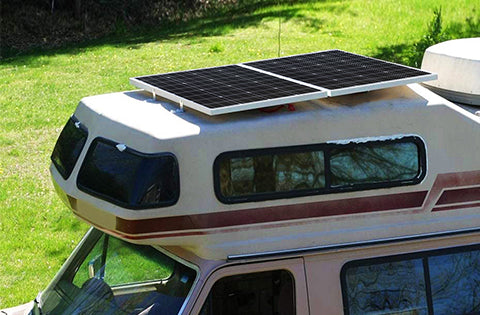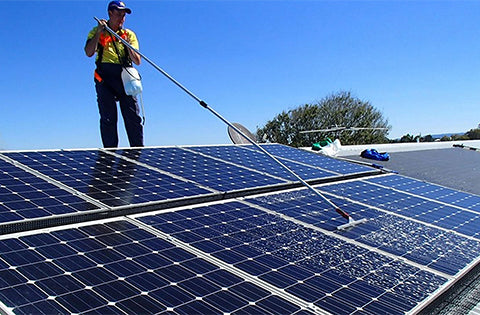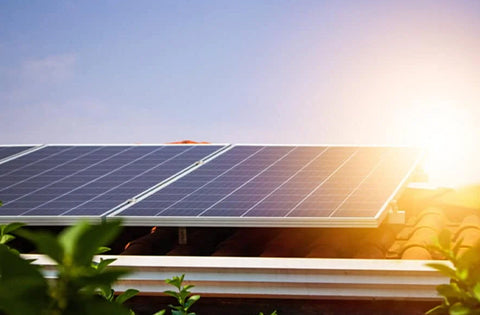One of the benefits brought by the development of solar power is that the convenience than ever for solar users to power their devices freely by using solar panels. But you may find yourself asking, how much solar do I need? If you under-size your system, you may not have enough power to live as you want. If you over-size it, you run the risk of wasting a ton of money. And then, let`s take a closer look at how systems work and how to find the right size for you.
How does solar power work in RVs?
RV solar systems work the same way as traditional solar panels for a home. The main difference is size and portability. Most systems have an array of solar panels, either mounted directly on your rig or on a portable module set up on the ground at your site.
The solar panels capture energy from the sun and convert it into electricity—specifically, DC power. The electricity from the solar panels passes through a charge controller, which conditions the power for safe and efficient storage in your batteries. Remember that without an RV battery inverter installed in your RV, you’ll only be able to use DC systems while boondocking. Inverters take the DC power from your batteries and change it to AC, which runs your microwave, air conditioner, and traditional outlets.

How to size your RV solar system
Solar power systems come in all sizes and can be scaled up or down based on your needs and budget. Now, you may be wondering, how much solar do I need? Here are the best ways to figure it out.
1: Identify your DC & AC appliances
One option for determining how much power you consume is to estimate based on the appliances and devices you use and how long you use them each day. Your goal is to arrive at an estimate of the total watt-hours consumed each day. Let’s see how we get there. All of your devices and appliances should have a label that tells you their power consumption in either watts or amps. If the device only lists amps, multiply by the voltage to get watts.
Once you have the power consumption of all of your devices (in watts), you need to determine how long (in hours) you typically use each device per day. Once you know the appliance’s usage time and power draw, you multiply them to get watt-hours. Now, repeat this process for all of your devices and appliances. Once you have the daily watt-hour consumption for each device, add them together to get the total. You’ll use this total number of watt-hours in a moment to determine how many solar panels you need. Many of our customers ask, “Can I Run My RV AC Unit on Lithium Batteries?” The answer is yes if you size your system correctly.
2: Do a camping test
You can make tedious assumptions and estimates about your power usage, or you can get out there and do some camping tests. This is one of the best ways to determine how much power you actually use. This method takes a little bit of time but will keep you from over-estimating and spending way too much on your solar system or under-estimating and not having enough solar. Plus, it’s a lot more fun than trying to add up all your devices and doing math.
If you already have batteries, fully charge them and then head off the grid for a weekend of camping. Use your RV as you normally would. Try not to use more or less power than you typically do. You’re doing a power audit, so you want the results to be accurate. Use a battery monitor to keep track of your battery bank charge status and your amp-hour consumption over 24 hours. When your 24-hour test period is complete, note how many amp-hours you have consumed. Multiply your amp-hour consumption by your battery voltage (usually 12.6V for lead-acid or 13V for lithium) to get your watt-hour power consumption.
Alternatively, you could do the same test while connected to shore power. Use a power monitor like the Watchdog surge protector and power monitor to tell you your watt-hour consumption over a 24 hour (or longer) period. Since the shore power charges batteries, you will get a reading on your RV’s AC and DC power needs.
How many solar panels do you need?
Now that you know your average daily power consumption, you can answer your original question of “How many solar panels do I need?”
To answer this question, we need to understand how much energy a solar panel truly generates. Most people assume that if they have a 100-watt solar panel in the sun for an average of eight hours during the day, it will produce 800 watt-hours of energy.
In reality, weather, time of year, and location all impact the efficiency of solar panels. A good rule-of-thumb is that a 100-watt solar panel will generate about 30 amp-hours.With this in mind, you can take your total daily energy consumption and divide it by 350 to get an estimate of how many 100-watt solar panels you need.
The above is the way of sizing your RV system, to learn more about solar RV system, please follow SOLARPARTS official website:
Twitter: Solarparts Instagram: Solarparts
Tumblr: Solarparts Pinterest: Solarparts
Facebook: Shenzhen Solarparts Inc
Email address: Philip@isolarparts.com
Homepage: www.isolarparts.com




